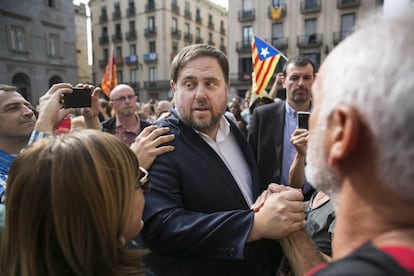The parallel reality of the Catalan economics chief
Oriol Junqueras maintains that massive company flight from the region will not affect the economy


“We’ll see. Forecasts like this have been made before and so far nothing has happened.” This was the reaction of Catalan deputy premier and regional economics chief Oriol Junqueras on October 5, after Banco Sabadell informed Spain’s stock market watchdog, the CNMV, that its board planned to vote on a possible departure that evening.
Five hours later, the forecast came true: Banco Sabadell, one of two major lenders in the region, voted to move its registered and tax addresses away from the breakaway region.
To date, around 1,300 companies have left Catalonia, according to the employers’ association Pimec. Meanwhile Junqueras, of the Catalan Republican Left (ERC), has consistently tried to talk down the impact of this flight, even going as far as to say companies will return when the region is independent, and claiming Madrid was pressuring businesses into leaving.
To date, around 1,300 companies have left Catalonia
The exodus began in September, when a large number of multinationals started to freeze investments and prepare their exit strategies depending on the outcome of the October 1 referendum. Some companies, such as the brokers GVC Gaesco, jumped the gun, leaving before the vote even took place. And after October 1, law firms and consultancies became a hive of activity as businesses activated their plan B: moving their legal and tax addresses away from Catalonia.
“There won’t be an exodus of businesses,” said Junqueras, just hours before banks and companies listed on Spain’s blue chip Ibex 35 index signed off on their transfer, or announced that they were considering it.
External warnings
The business world tried to convince the Catalan government, which is headed by a coalition called Junts pel Si (Together for Yes), to plug the dam. The Barcelona-based Círculo de Economía business lobby did so in a private meeting with Catalan Premier Carles Puigdemont, just two days before he appeared in the regional parliament and declared independence, then immediately suspended it. After his ambiguous speech, companies continued to leave – not just financial players and Ibex firms, but small and medium-sized businesses as well.
The International Monetary Fund (IMF) has also weighed in, along with credit rating agencies. The PR firm Kreab said that 55% of international firms “are not going to look at Catalonia as an investment destination.”
55% of international firms “are not going to look at Catalonia as an investment destination”
Junqueras eventually accepted the situation but played it down. “The movement of a registered address does not affect the productive reality of companies,” he said, ignoring the fact that firms are also changing their fiscal residence, and that executives are relocating. The Catalan government pushed the line that companies would return, but some, such as the publishing giant Planeta, said their decision was “definitive.”
All of these ideas were laid out in a document prepared by Junqueras’ department, which sent it to investors and consulting firms. The report presents a rosy picture of Catalan growth, investment and exports but is based on pre-referendum data. It concludes by stating that given that companies know “the desire of Catalonia to become a state,” the independence “process was not going to affect the economy.” But sources says many investors blanched at the second part of the document, where it was stated that it was “very unlikely” that Catalonia would remain outside the European Union and announced plans to create a Bank of Catalonia.
Junqueras was set to meet with multinational firms this past Friday, but called off the meeting. Meanwhile, on October 17 the Socialist Party of Catalonia (PSC) called on Junqueras to appear in the Catalan parliament, but this has not happened yet. Last Friday, the PSC said it was now calling for Junqueras to appear before the parliament's economics committee, where the independence bloc has a minority, alongside Santi Vila, the head of the regional business department. Vila, of the Catalan European Democratic Party (PDeCat), is said to be far more active in dealing with the economic crisis than Junqueras, according to sources in Catalan business circles.
While Junqueras was ruling out an exodus of firms, Vila was setting up a crisis cabinet that periodically looks at economic indicators and consults with business groups and unions. Retailers have participated in this cabinet, for example, asking for the Catalan government to ensure that pro-independence demonstrations do not take place on work days.
Large firms account for almost 40% of Catalan GDP and just 100 firms account for half of all exports
Sources in the Catalan executive say the reality seen by this group is distinct from what Junqueras has observed. “The numbers are not what the central government has announced, but we are seeing a drop-off in activity in sectors like tourism,” those sources say, confirming the concerns of Vila.
Last Thursday, speaking to the Barcelona Chamber of Commerce, Junqueras finally admitted that he wasn’t “pleased” by the departure of some businesses from the region” but noted that “260,000 businesses have decided to stay.” However, he failed to note that many of those “businesses” are actually self-employed people. Large firms account for almost 40% of Catalan GDP, and just 100 companies account for half of all exports.
English version by George Mills.
Tu suscripción se está usando en otro dispositivo
¿Quieres añadir otro usuario a tu suscripción?
Si continúas leyendo en este dispositivo, no se podrá leer en el otro.
FlechaTu suscripción se está usando en otro dispositivo y solo puedes acceder a EL PAÍS desde un dispositivo a la vez.
Si quieres compartir tu cuenta, cambia tu suscripción a la modalidad Premium, así podrás añadir otro usuario. Cada uno accederá con su propia cuenta de email, lo que os permitirá personalizar vuestra experiencia en EL PAÍS.
¿Tienes una suscripción de empresa? Accede aquí para contratar más cuentas.
En el caso de no saber quién está usando tu cuenta, te recomendamos cambiar tu contraseña aquí.
Si decides continuar compartiendo tu cuenta, este mensaje se mostrará en tu dispositivo y en el de la otra persona que está usando tu cuenta de forma indefinida, afectando a tu experiencia de lectura. Puedes consultar aquí los términos y condiciones de la suscripción digital.








































